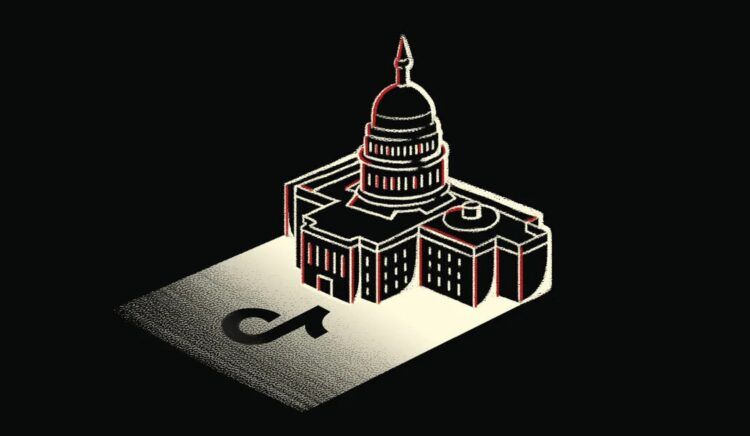TikTok congressional hearing has been held recently. The CEO of TikTok, Shou Zi Chew had a lot of controversial statements about the ongoing possible TikTok USA ban.
TikTok CEO Shou Zi Chew faced an intense grilling during a four-and-a-half-hour congressional hearing on Thursday. The TikTok congressional hearing was relentless, with both Democrats and Republicans attacking him with a never-ending line of vicious questioning. TikTok later dismissed the politicians’ tactics as “grandstanding”. However, amidst the frustration of the lengthy questioning, some interesting revelations were made.
TikTok CEO Shou Zi Chew disclosed that his own children do not use TikTok as they live in Singapore, where the version of the app for children younger than 13 is not available. But he did clarify that the children’s version of the app is available in the US, and he would allow his children to use it if they were in America.

All eyes were on Project Texas at the TikTok congressional hearing
Another revelation, and probably the most important one, that emerged during the hearing was that ByteDance engineers in China have access to some US data. TikTok CEO Shou Zi Chew revealed that although ByteDance has a policy called “Project Texas” that stores all data in the US under the watch of American firm Oracle, the project is not fully operational. He admitted that Chinese engineers have access to data, which was a point that politicians kept returning to, questioning how it could be secured against the Chinese government.
Chew’s ownership of shares in ByteDance also came under scrutiny at TikTok congressional hearing. Although the Chinese company owns TikTok, Chew attempted to distance TikTok from ByteDance. He was initially hesitant to say whether he owned shares in ByteDance but eventually confirmed that he did, downplaying the connection.

Despite Chew’s efforts to defend the platform, there was bipartisan criticism of TikTok, with both Democrats and Republicans agreeing that TikTok posed a security threat. TikTok later complained that the TikTok congressional hearing did not focus enough on the platform’s measures to keep data safe.
The company has reportedly been spending millions of dollars on an aggressive lobbying effort in Washington, and this hearing demonstrated that it will need to spend a lot more to win over lawmakers.
Some say it is all an attack on freedom of speech
The First Amendment of the US Constitution safeguards freedom of expression by preventing Congress from restricting the press or an individual’s right to speak freely, among other rights. According to James Lewis, the director of the Center for Strategic and International Studies’ strategic technologies program, limiting TikTok content may be considered as censorship. Despite the fact that he said:
“It seems a little silly to say that a bunch of lip-synching 15-year-olds are protected speech, but it’s protected speech”
-James Lewis
The American Civil Liberties Union and the Foundation for Individual Rights and Expression have both spoken out against a potential TikTok ban. They have cautioned that the ban could pose significant First Amendment concerns and could lead to legal action being taken.

The background
TikTok has repeatedly claimed that it does not share data with the Chinese government and that only a US-based security team has access to US user data sourced from China. However, it was revealed during the recent congressional hearing that ByteDance engineers based in China can access some US data.
A new federal bill has been introduced which is not the first to concern TikTok. Senator Rubio proposed a plan last year that would require app developers to disclose ownership information, while another proposed rule would prohibit federal agencies from using TikTok. A bill introduced this year would also prevent TikTok employees in China from accessing data belonging to US users.
The Department of Homeland Security, the State Department, and the US military have already banned TikTok on devices they manage. All of these have led to TikTok CEO Shou Zi Chew testifying at TikTok congressional hearing.
What if?
The TikTok situation underscores the increasingly complex relationship between the U.S. and China, especially in the technology sector. As the world becomes more interconnected, the issue of data security and national security risks will only become more crucial, and companies like TikTok will need to navigate these challenges carefully to continue growing and succeeding in the future.
The separation of TikTok from ByteDance would be a major move for the app, which has gained immense popularity around the world, particularly among younger users. TikTok’s success, however, has come at a cost, as it has faced various challenges related to its ownership and data practices.

If TikTok were to separate from ByteDance, it would follow a trend of Chinese tech companies going public or spinning off from their parent companies in recent years. This includes Alibaba’s Ant Group, which went public in late 2020, and Tencent’s music streaming service, which was spun off in 2021.
However, any potential separation of TikTok from ByteDance would face significant obstacles. The process would require approval from both U.S. and Chinese regulators and the consent of ByteDance’s leadership. Additionally, a sale or initial public offering would have to be carefully planned and executed to ensure that TikTok continues to operate smoothly and without interruption.
While we didn’t get answers to all these questions at the TikTok congressional hearing, it is a fact that the popular app will have to make some decisions about USA data in the future. TikTok CEO Shou Zi Chew has only tried to protect the app in TikTok congressional hearing, while the US authorities say that the data cannot be protected by a Chinese company and want TikTok to separate from its parent company ByteDance.
Let’s see what steps TikTok will have to take to maintain its presence in the USA.





